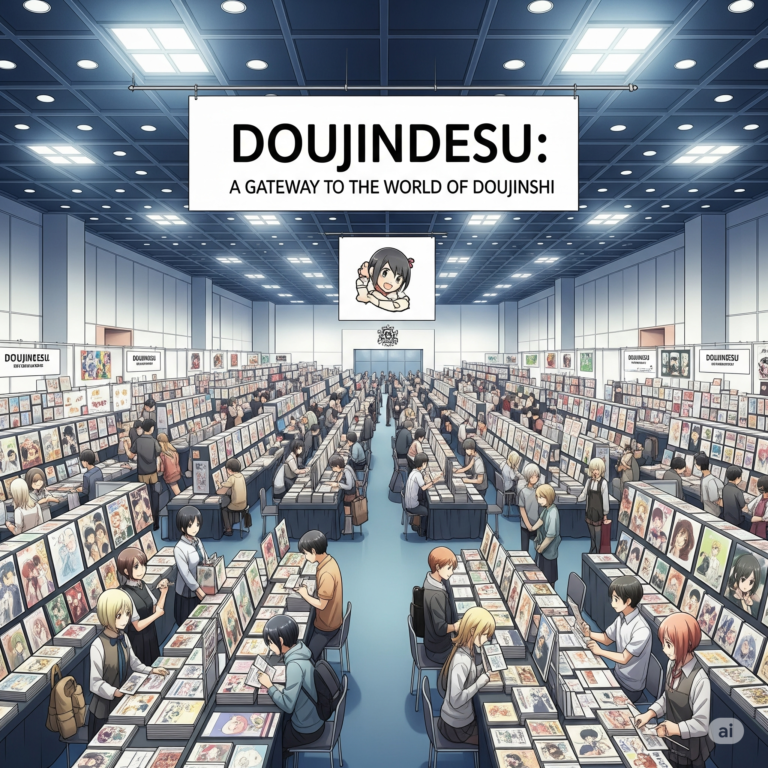The global anime and manga community is more than just a fanbase—it’s a thriving creative ecosystem. Among the most fascinating facets of this ecosystem is the world of doujinshi, or fan-created comics and novels. For those outside of Japan, platforms like Doujindesu open a portal into this underground yet dynamic culture. But what exactly is Doujindesu, and why has it become such a popular destination for fans of doujinshi?
This article delves into the platform’s role in fan culture, its appeal, its ethical implications, and its place in the evolving digital anime landscape.
What is Doujindesu?
Doujindesu is an online website dedicated to hosting and sharing doujinshi content. The name “Doujindesu” roughly translates to “It’s Doujin,” a phrase that succinctly conveys the platform’s mission. It functions as an archive of fan-made manga, many of which are inspired by famous franchises such as Naruto, One Piece, Bleach, My Hero Academia, and countless others.
The site primarily offers English-translated doujinshi, making it a major hub for non-Japanese speakers who wish to explore this rich subculture. Unlike mainstream manga sites, Doujindesu focuses on fan works that are often more niche, experimental, and deeply personal.
Understanding Doujinshi: More Than Just Fan Fiction
At its core, doujinshi (同人誌) refers to self-published works, often created by amateur artists and writers. However, the line between amateur and professional is often blurred. Many established manga artists began their careers by creating doujinshi, honing their skills and building a following before entering the professional industry.
These works typically fall into several categories:
-
Parodies and Fan Works: Based on existing characters and universes, often romantic or comedic in nature.
-
Original Works: Entirely new stories and characters created from scratch.
-
Spin-offs and “What-If” Scenarios: Alternative endings, timelines, or character pairings that deviate from the original canon.
Doujinshi allows creators to explore topics often considered too niche, taboo, or experimental for mainstream publications. This freedom results in a diverse and unpredictable array of content.
Why Doujindesu Appeals to Fans
Doujindesu has carved out a loyal user base due to several appealing features:
1. Extensive Library of Translated Doujinshi
One of the biggest hurdles for international fans is the language barrier. Doujindesu hosts a vast library of doujinshi that has been translated into English, often by volunteers or fan communities.
2. User-Friendly Interface
The site is designed for simplicity, with straightforward navigation and search features. Categories, tags, and filters make it easy for users to find specific genres or pairings.
3. Regular Updates and Community Interaction
Doujindesu is regularly updated with new content. It also features user interaction such as comments, likes, and sharing tools, creating a sense of community among readers.
4. Niche Appeal
Doujindesu hosts a variety of doujinshi that range from light-hearted comedy to mature and emotional narratives. Many of these stories cater to niche subcultures within the anime fandom, including yaoi, yuri, and more unconventional genres.
The Rise of Fan-Driven Creativity
The increasing popularity of platforms like Doujindesu reflects a broader trend: fans are no longer passive consumers. They are content creators, critics, and cultural contributors. Fanfiction, fan art, cosplay, and doujinshi represent ways in which fans actively reshape and reinterpret media to reflect their own experiences and identities.
Doujindesu, in this sense, is more than a website—it is part of a global movement where fans create alternative narratives and challenge mainstream storytelling structures.
Legal and Ethical Considerations
Despite its popularity, Doujindesu exists in a legal gray area. Here’s why:
1. Copyright Infringement
Many doujinshi works are based on copyrighted characters and franchises. Although Japan’s domestic laws are relatively lenient when it comes to doujinshi (especially due to the huge economic impact of Comiket and similar events), the same cannot be said for international copyright law.
Websites like Doujindesu, which host or distribute these works without the explicit permission of the original creators or copyright holders, may be infringing upon intellectual property rights.
2. Ethical Consumption
From an ethical standpoint, fans should consider the wishes of doujinshi creators. Some explicitly state they do not want their work distributed or translated online, especially outside of Japan. Disregarding these wishes can harm the creators’ autonomy and revenue.
3. Supporting Creators
There are legal avenues to purchase and support doujinshi artists, such as:
-
Booth (by Pixiv)
-
DLsite
-
Melonbooks (for Japanese readers)
Supporting these official channels not only respects creators’ rights but also helps them continue producing more content.
Alternatives and Legal Resources for Doujinshi
For fans interested in supporting doujinshi creators legally and ethically, here are a few legitimate platforms:
-
Pixiv Booth: An international-friendly platform where artists can sell physical and digital doujinshi.
-
DLsite: A platform offering doujinshi, games, and other digital media, often with English translations.
-
Etsy and Storenvy: Some independent creators sell zines and doujinshi through these Western e-commerce platforms.
-
Patreon and Ko-fi: Many doujinshi artists use these to connect directly with fans and offer exclusive content.
Conclusion: The Future of Doujinshi and Doujindesu
Doujindesu has played a pivotal role in popularizing doujinshi beyond Japan, offering global fans an intimate look into the creative minds of the anime community. It represents the passion, imagination, and dedication of fans who want to tell stories that official works may never explore.
However, with this access comes responsibility. As fans, it’s important to support creators, respect copyright laws, and consume content ethically. The future of doujinshi is undeniably global, and platforms like Doujindesu are part of that evolution—bringing underground art into the spotlight, one scan at a time.

